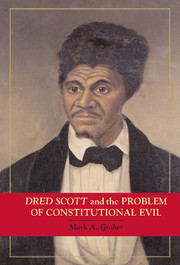Introduction
Published online by Cambridge University Press: 05 June 2012
Summary
REHABILITATING DRED SCOTT
J. P. Morgan demanded that his attorneys make only those legal arguments that advanced his causes. When informed by counsel that his business plans violated federal law, Morgan bluntly replied: “I don't … want a lawyer to tell me what I cannot do; I hire him to tell me how to do what I want to do.” Morgan's example seems to inspire contemporary constitutional rhetoric. Constitutional theorists of all political persuasions often display less interest in determining what is constitutional than in making arguments that they believe will help the social movements they favor achieve desired ends constitutionally. My claim that the result in Dred Scott v. Sandford may have been constitutionally correct – and that Stephen Douglas understood the antebellum constitutional order better than Abraham Lincoln – is likely to startle, puzzle, and probably offend readers reared on a steady diet of constitutional advocacy. No decent person living at the dawn of the twenty-first century supports the proslavery and racist policies that Douglas and Chief Justice Roger Taney championed. Nevertheless, important normative, historical, and constitutional reasons exist for rehabilitating the Dred Scott decision.
Dred Scott and this book are about the problem of constitutional evil. The problem of constitutional evil concerns the practice and theory of sharing civic space with people committed to evil practices or pledging allegiance to a constitutional text and tradition saturated with concessions to evil.
- Type
- Chapter
- Information
- Dred Scott and the Problem of Constitutional Evil , pp. 1 - 14Publisher: Cambridge University PressPrint publication year: 2006

